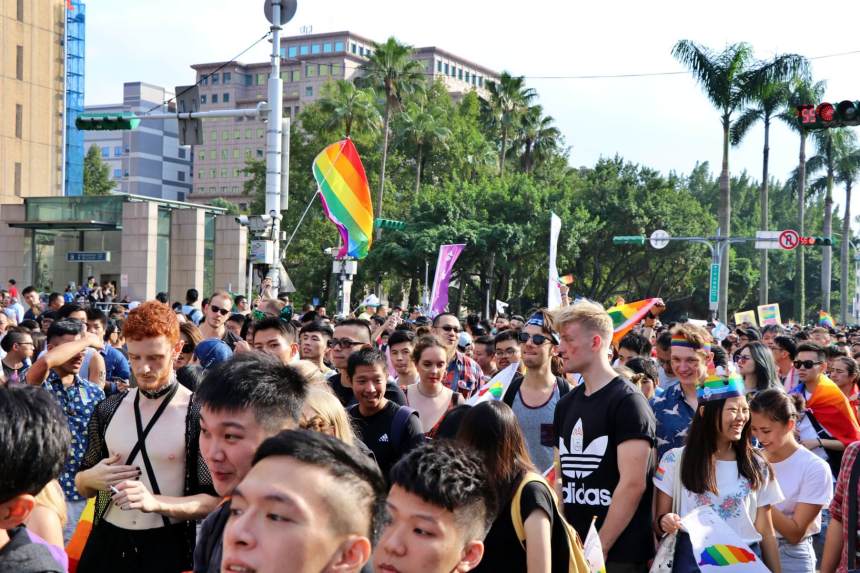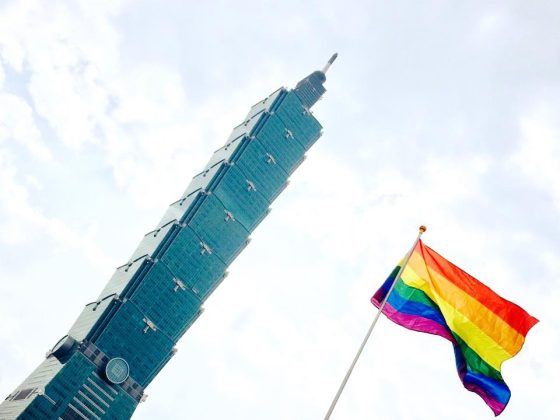Words by Seb Morgan
What’s changed for the LGBTQ community since Seb Morgan experienced his first Taiwan Pride and how Taipei’s “queer renaissance” is presenting itself in the city
On October 31, 2015, I walked in my first Taiwan Pride Parade—by accident. Having landed at Taipei Taoyuan International Airport for the first time that very same morning, I had gone to Chiang Kai Shek Memorial Hall to do a little sightseeing, and somehow, while looking for an MRT entrance, stumbled right into the 80,000-person procession as it rounded Ketagalan Road and came to its conclusion outside the Presidential Office Building.
What I saw stuck in my mind. Revelers of all ages, local and international, sported rainbow flags and chanted slogans, engaging in what was as much a political protest as it was a celebration of identity.
(Read more: Pride Hopping this Fall? Here’s Why Taiwan Should Be Your First and Only Stop)
Now, this wasn’t my first day at the rodeo. I’d marched in pride processions in Madrid, Osaka, Shenzhen, and Birmingham. But Taiwan Pride struck me as something special nonetheless. Of course, being a first-time tourist, I wasn’t to know that 2015 was the year that pride celebrations really took off in Taipei, cementing the city as a top destination for LGBTQ travellers all across East Asia.
But even so, fresh through the arrivals gate, I could see that this right here was progress; a society that after decades of tireless activism was reconciling tradition with progress, culture with inclusivity—and rejecting the decades-old notion that being queer was a western fad and didn’t belong in Asia.
Four years later, that impression hasn’t altered. Being LGBTQ in Taipei for me continues to be defined by a single word: change. You don’t need to be a well-read insider of the community to know that earlier this year, Taiwan scored a major victory for equal rights with the passing of Asia’s first same-sex marriage law, paving the way for greater inclusivity in a continent that lags at the back of the pack when it comes to gay rights.
This recent progress has had major implications for the way that the LGBTQ community is received in Taipei. If the rest of Asia is your point of comparison, this is one of the few major cities where same-sex couples can walk hand-in-hand down the street without becoming the focus of unwanted attention.

I’ve seen elderly men stop drag queens on the street to compliment them on their appearance, there’s a thriving queer book, restaurant, and café culture, and also growing awareness and openness about HIV (PrEP is readily available, too). Now sure, you’ll find lively queer-friendly spaces across Japan, Thailand, and Hong Kong. But Taipei takes acceptance beyond the scope of nightlife; it’s a place where identity can be lived, rather than designated a few hours of a Saturday evening.
Under these circumstances, it’s not surprising that Taipei is in the middle of a queer renaissance. Compare the city today to how it was a decade ago, and you’ll notice a dramatic increase in the number of queer parties, safe spaces, and openly gay public figures. In particular, the city’s drag scene is budding with up-and-coming local performers, many of whom you can catch making their debut at regular events such as Drag Labs at Café Dalida and the monthly Blush parties at B1. Similarly, nascent voguing event Taipei is Burning is helping give the city’s underground ballroom scene the visibility it so thoroughly deserves.
(Read also: Ultimate Taipei LGBT Map)
Elsewhere, the community is gaining the matured mainstream acceptance that you might only expect in places like New York and Amsterdam. Taipei has become an increasingly frequent tour destination for alumni of the hit TV show RuPaul’s Drag Race—Pearl, Kimchi, and Miss Fame have all passed through here, while Aja will be joining that list at the Pose: Pride Party on Saturday October 26.
Meanwhile, regular shows at drag bar Belle Taipei mean that more seasoned local queens are able to turn their art into their primary source of income. “I’m really grateful for how Belle has given performers such as myself the opportunity to make a profession out of what we love,” resident queen Nymphia Wind recently shared.
(Read also: PRIDE, Healing and Taiwan’s LGBTQ Community: A Conversation with Olivia Wu)
Now, all this isn’t to say that Taipei enjoys complete, definitive equality. The road to this year’s marriage ruling was a long and bumpy one, Taiwanese LGBTQ youth and adults still face pressure from more conservative family members, and the country needs to address legal deficiencies concerning education in schools and adoption rights for same-sex couples.
(Read also: Taiwan votes against LGBT equality, but all is not lost)
However, compare the city today to how it was 15 years ago, when there were no legal protections for LGBTQ people at school or in the workplace, and the speed with which this city has changed is phenomenal. If a historically conservative society can achieve so much in so little time, who’s to say that the same couldn’t happen in Japan, Korea, or anywhere else for that matter?
Just over three decades ago, Chi Chia-wei, the father ofTaiwan’s equal rights movement, was detained by police suspiciously shortly after he became the first person in the country to come out on national television. This year, he watched at Taipei City Hall as dozens of same-sex couples became the first in the country to register their marriages. That’s change. It’s just as President Tsai tweeted on May 17, hours before the vote on same-sex marriage took place: “We can show that progressive values have a place in East Asian society. Today, we can show the world that #lovewins.” Taipei has been doing that ever since.
(CNN: After years of fierce debate, Taiwan celebrates the first same-sex weddings in Asia)
Celebrate Taiwan Pride 2019 with MyTaiwanTour:
Taipei Hipster Tour With Monthly Special Drag Queen Show
Lez’s Meeting After Party of Gay Pride Tour











